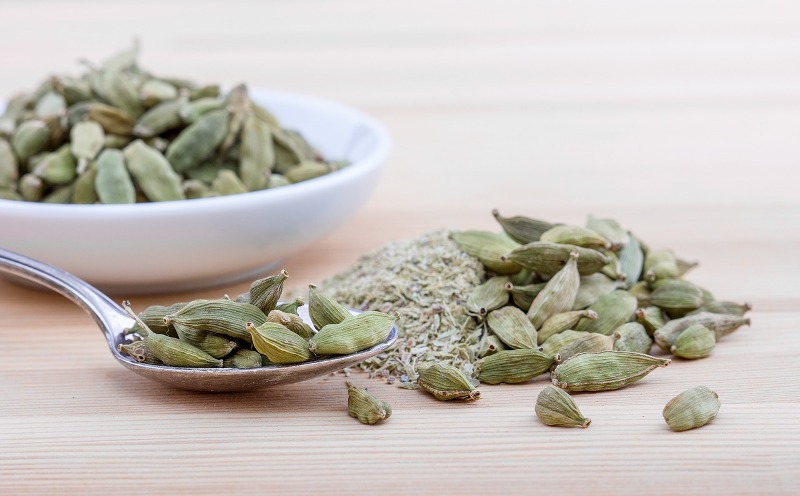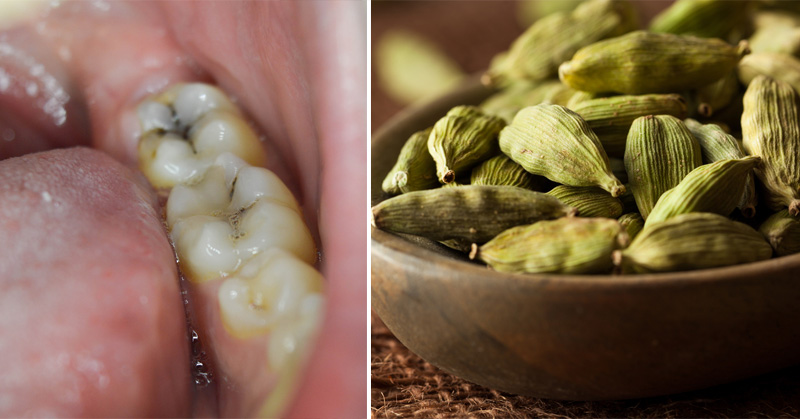Cardamom is a spice with a warm and sweet, floral flavor. This herb, often seasons Indian dishes, boasts a nice sum of phytonutrients. It also contains a healthy dose of manganese, magnesium, calcium, potassium and phosphorus. Cardamom benefits include the ability to fight bad breath, lower blood pressure, improve digestion and more.
Cardamom Benefits
1. Relieves Bad Breath
Cardamom benefits your oral health in many ways. For one, it helps with bad breath, and who doesn’t want to relieve bad breath? In a study conducted by the Department of Microbiology at Kurukshetra University in India, researchers found that cardamom extract has antimicrobial effects on oral bacteria. In fact, chewing on cardamom seeds can help kill harmful bacteria in the mouth and eliminate bad breath. (1)
2. Fights Cavities
As you may have guessed already, killing bacteria in the mouth has other benefits, too. By limiting bacteria, cardamom benefits oral health by also fighting cavities. For example, chewing on cardamom seeds can help prevent cavities and tooth decay. Specifically, cardamom encourages saliva, which helps to cleanse the mouth and clean the teeth. (2)
3. Treats Cancer
Research shows that cardamom benefits may include the ability to naturally treat cancer. For example, in a 2012 animal study published in the Journal of Medicinal Food, researchers found that oral administration of cardamom was able to significantly reduce the occurrence and number of tumors. Thanks to its ability to inhibit, delay and reverse cancer formation, we can conclude that cardamom boasts anti-cancer properties. Studies have also shown that cardamom can help prevent cancer by encouraging a healthy immune responses in the body. (3, 4)
4. Lowers Blood Pressure
Cardamom benefits include the ability to naturally lower blood pressure. In fact, studies have shown that cardamom was able to decrease systolic and diastolic blood pressure in individuals who were newly diagnosed with primary stage 1 hypertension. Cardamom also increased the participants total antioxidant status by 90% after three months. Furthermore, the study subjects “experienced a feeling of well being without any side-effects.” Imagine that. (5)

5. Helps Manage Diabetes
Another chronic health condition in the U.S. stems from high blood sugar. And yes, cardamom benefits diabetes and blood sugar levels, too. Research has shown that cardamom helps to manage diabetes symptoms, thanks to the manganese it contains. Manganese-rich foods are beneficial to a diabetic diet. Additionally, studies have shown that people with diabetes who have higher blood levels of manganese are more protected from LDL cholesterol, compared to those with lower levels of manganese. (6)
6. Improves Digestion
Cardamom is often used in Chinese medicine and Ayurvedic medicine to treat digestive problems. It’s no wonder people chew on cardamom after eating a heavy meal. You see, cardamom can relieve gastrointestinal disorders like flatulence and stomach cramps. It can also help prevent stomach ulcers caused by aspirin. (7)
7. Treats Asthma
Like cacao, cardamom benefits your breathing. As such, it can also provide relief from asthma. You see, compounds in cardamom are bronchodilators. That means they can expand the bronchial tubes to improve breathing. Studies have shown that cardamom helps to decrease resistance in the airway and increase airflow to the lungs, to ease breathing. (8)
Cardamom vs. Coriander
Yes, cardamom and coriander offer some similar health benefits but in different ways. Cardamom comes from the seed of plants in the ginger family, while coriander comes from the seed of the cilantro plant. Both spices can lower high blood pressure, relieve digestive issues and help manage diabetes. They also offer different types of benefits. You can use cardamom to fight bad breath, cavities and asthma, while coriander serves as a natural remedy for UTI’s and high cholesterol levels.
Cardamom Precautions
With no known side effects, cardamom seems safe to consume. However, you should not use this herb if you have gallstones. Also, pregnant and nursing mothers should speak with their healthcare providers before use to ensure safety.


